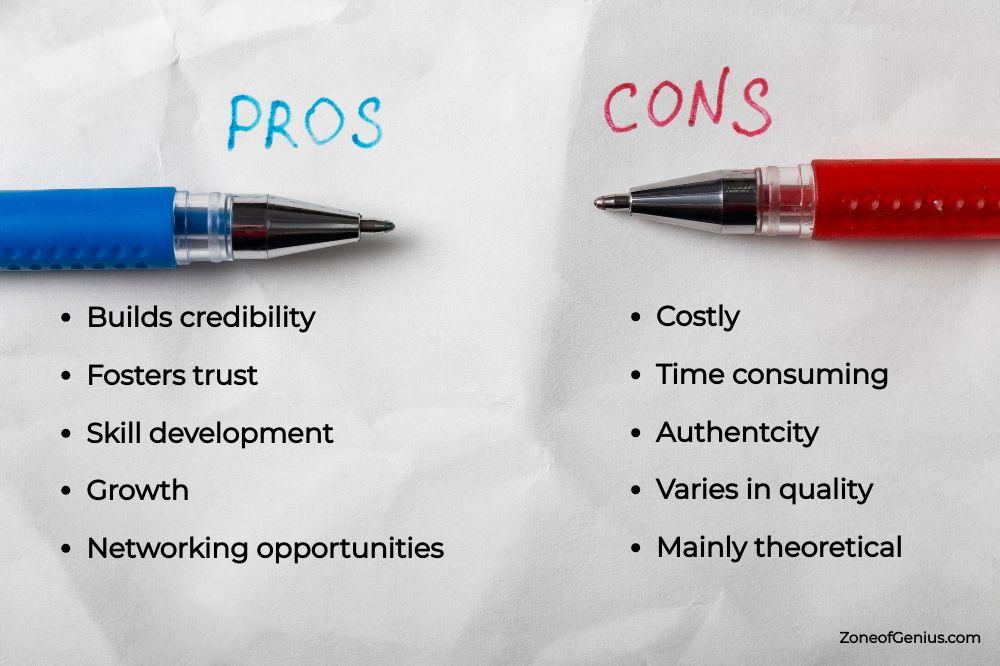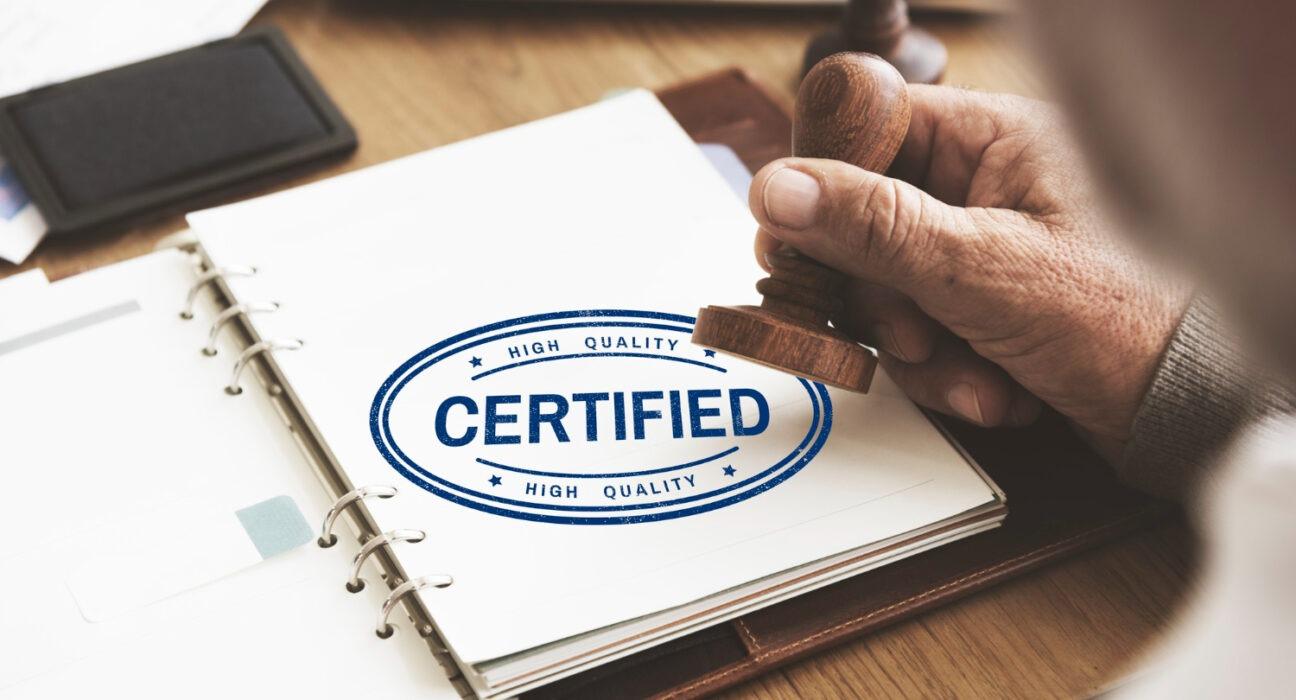Are coaching certifications worth it?
I asked this question on my Facebook page. And I got tons of replies, including from those who really wanted to know. (I will be sharing a link to the post at the bottom of this article.)
Now, coaching certifications have sparked countless debates among coaches, authors, speakers, small business owners, consultants, and event hosts alike. It has been and remains a hot topic of discussion.
Recently, there has been a growing popularity of coaching in various fields. However, before signing up for certification, let’s evaluate the pros and cons. Are coaching certifications worth the investment of time and money? Are there alternative paths to reaching your coaching goals?
Let’s find out the truth about coaching certifications in this blog post. Let’s unravel facts that can help you decide what’s best for your coaching journey.
Related article: Why Every Professional Nees a Business Coach
The Benefits of Coaching Certifications
The following are the pros and benefits of having a coaching credential:
Builds Credibility and Trustworthiness
Think of a coaching certificate as your badge!
Certified coaches can showcase their credentials proudly, displaying a commitment to their craft.
One of the commenters in my posts said, “…The coaching industry is quite “loose” right now. Anyone can call themselves a coach. So, I like to distinguish myself from the crowd by adhering to a standard that ICF has put forth.” (@Sheeba Daniel Varghese).
Consider this: Would you trust a surgeon without a medical degree to operate on you? Probably not. The same principle applies to coaching. Clients are more likely to trust a certified coach with their personal or professional development.
I’m a certified coach. It’s an extra investment in education. And some of my clients ask for the certification (more so organizations vs. individual clients). The question could be compared to degree/no degree. I see certification as a commitment to excellence as well as door openers. There is a requirement to stay educated and ethically serve customers.
Simone Morris
Most clients want to know that they are in good hands when it comes to coaching. A coaching certification can be a powerful way to establish credibility. It signals to potential clients that you’ve met specific standards and have the skills needed to guide them effectively.
However, depending on your marketing strategy, this may not apply to you. In one of the comments on my post, Bob Roitblat replied to my post, saying, “I have never had a coaching client ask me if I’m certified, nor has a speaking client.”
Sometimes, clients like to work with testimonials. But the truth is that having a well-recognized certification can help instill confidence and trust in your clients faster.
Skill Development and Knowledge
Coaching requires specific skills and knowledge. It’s a nuanced practice that requires a deep understanding of human behavior, psychology, and effective communication. Coaching certification curriculums offer structured training programs that cover these essential aspects.
These programs typically include modules on active listening, goal setting, feedback delivery, and more. They equip you with a toolbox of skills and techniques that can make a profound difference in your coaching sessions.
Sounds a little basic, right? Not quite.
There are specialized coaching certifications. In addition to the foundational coaching skills, coaching training programs often allow you to specialize in a particular niche. Whether it’s life coaching, executive coaching, or wellness coaching, you can tailor your certification to align with your passion and career goals.
These courses provide a solid foundation upon which you can build and develop your coaching expertise.
Networking Opportunities
Coaching is a dynamic field, and connections can make a significant difference in your success as a coach.
Certification programs often bring together like-minded individuals who share your passion for coaching. These connections can be invaluable in your coaching journey.
Imagine having access to a network of experienced coaches who can provide mentorship, guidance, and support as you navigate the coaching world. Certified coaches often become part of a coaching community that fosters learning and growth, helping you stay up-to-date with industry trends and best practices.
Also, building relationships with other certified coaches can lead to collaborations, referrals, and a support system that can help you overcome challenges in your coaching journey.
There’s also the “Industry exposure benefit.”
Certification programs often provide opportunities to attend conferences, webinars, and workshops hosted by industry leaders. These events can broaden your horizons and keep you updated on the latest coaching trends and best practices.

The Drawbacks of Coaching Certifications
While coaching certifications offer numerous benefits, they have their downsides. Let’s take a closer look at some cons of coaching certifications.
The Cost and Time Commitment
Certification programs come at a price, both in terms of money and time.
High-quality certification programs can be pricey, and they often require a substantial time investment. Consequently, you’ll need to balance the financial aspect with your commitment to completing the program.
Therefore, it’s essential to weigh the financial investment and time commitment against the potential benefits. You’ll need to consider whether the return on investment justifies the expense.
More importantly, for many aspiring coaches, pursuing certification means juggling studies, work, and personal life. Finding the right balance can be challenging.
Variability in Certification Quality
Not all coaching certifications are created equal.
The coaching industry lacks standardized regulation. This means there’s a wide range of certification programs available, from reputable to questionable.
Comparing curriculums and testimonials can help. Research the certification body, read reviews, and speak to alumni if possible. Opt for certifications that are recognized and respected in the coaching community to ensure you’re investing in a worthwhile credential.
Theoretical vs. Practical Knowledge
Coaching is an art as much as it is a science. While the theory is essential, practical experience plays a significant role in becoming an effective coach.
Like many certifications, coaching certifications often focus heavily on theory and classroom learning.
While this foundational knowledge is essential, it may not always translate seamlessly into real-world coaching scenarios. (Sometimes, this may seem like a repetition for those getting multiple coaching certifications.)
The gap between theoretical knowledge and practical coaching experience can be daunting. It’s one thing to understand coaching principles in theory, but it’s another to apply them effectively in real-life coaching sessions.
It can be a challenging transition for some certified coaches. Most times, coaching training programs focus heavily on theory and may not adequately prepare you for real-world coaching scenarios.
List of Popular Coaching Certification Programs
Through my post about coaching certification programs, I received comments on different coaching certification programs.
Here’s a list of certifications mentioned in the post:
- Institute for Professional Excellence in Coaching (iPEC) Certification
- John Maxwell’s coaching certification
- International Coach Federation (ICF) Certification
- Crush the Stage
- The Professional Association for ADHD Coaches (PAAC)
- Association for Coaching Certification (ACC)
- Business Made Simple Coaching Certification
- Marshall Goldsmith’s Stakeholder-Centered Coaching Certification
Lists of Other Popular Coaching Certification
Choosing the right coaching certification can be a game-changer for your coaching career. Here are some reputable and popular coaching certifications to consider:
- Center for Credentialing & Education (CCE) Certification
- International Association of Coaching (IAC) Certification
- National Board for Health & Wellness Coaching (NBHWC) Certification
- Institute of Coaching (Harvard Medical School) Certification
- Coach Training Alliance (CTA) Certification
- Center for Executive Coaching Certification
- Life Purpose Institute Certification
- Tony Robbins Results Coaching Certification
- Center for Creative Leadership (CCL) Coaching Certification
- Wellcoaches Certification
- Coach U Certification
- International School of Coaching (ISC) Certification
- Erickson Coaching International Certification
- Health Coach Institute (HCI) Certification
- The Coaches Training Institute (CTI) Certification
- Exactly What to Say by Phil M. Jones
Remember, the best coaching certification for you depends on your niche, career goals, and personal preferences. You can do more research, speak with an alumni, and choose the one that aligns with your coaching journey.
Alternative Paths to Coaching Success
Did the drawbacks of coaching certifications give you pause? Don’t worry about that. There are alternative routes to achieving coaching success.
Self-Study and Self-Improvement
Like any other skill, self-directed learning is a powerful way to enhance your coaching skills. There are many self-directed learning resources available.
These resources include:
- Books
- Online courses
- Webinars
- Workshops
- Mentorship from a friend
The above resources can provide you with valuable knowledge and skills.
Self-study is a viable option for those who prefer a more flexible and budget-friendly approach to coaching development.
You can curate your learning journey, selecting resources that align with your coaching goals.
Although it may require more discipline and self-motivation, self-study can be an effective way to acquire knowledge and skills at your own pace.
Investing in your personal growth and self-awareness can be just as valuable as formal certification. It can make you a more empathetic and effective coach. Better still, it is an inspiration to those who are aware of your journey.
Mentorship and Apprenticeship
Mentorship and apprenticeship programs provide hands-on coaching experience under the guidance of an experienced coach.
This approach allows you to learn by doing, gaining practical insights and skills in real coaching situations.
Mentorship can be especially beneficial if you’re looking to specialize in a particular niche or industry. It offers personalized guidance and a supportive environment for your growth as a coach.
Mentors can provide guidance, share their wisdom, and help you navigate the challenges of coaching. They may even give you a headstart on your networking path.
Industry-Specific Expertise
If you have a background or expertise in a specific field, such as business, psychology, or wellness, you can leverage that knowledge in your coaching practice.
Many successful coaches have found their niche by combining their industry expertise with coaching skills.
Clients often seek coaches who understand the unique challenges and nuances of their industry. Your domain knowledge can set you apart and make you a sought-after coach in your niche.
Some Case Studies and Testimonials
I will be sharing the views of those who supported coaching certificates and those who didn’t.
It would be nice to give instances of well-known coaches and their career paths. However, I would like to share the views of coaches, leaders, and those who shared their opinions on the topic.
You can also share your views in the comment section below!
We need all hands on deck to help each other stay on the right path to achieving their coaching goals.
Let’s dive into some real-world examples. We’ve gathered stories from certified and uncertified coaches who’ve seen remarkable transformations in their clients’ lives. I hope they serve as a source of inspiration.
Success Stories of Certified Coaches
Siobhan Murphy says:
“I am certified by the ICF as a Master Certified Coach, and it has opened doors for me in so many coaching companies who subcontract work to MCC’s, especially European companies needing coaches for their NYC clients. It’s put me on the running for opportunities that I wouldn’t even be considered for if not for the credential.”
Deanna Cotten says
“I’m going to shout YES! Business Made Simple Certified. This program has made me a better coach and helped me grow as a leader and in business. The perks have been the network and connections that come from the investment!!!”
What these comments above have in common is how their certifications opened the doors to more opportunities.
Success Stories of Non-Certified Coaches
On the other hand, we’ll also showcase success stories from coaches who chose alternative paths to coaching success from the comments.
Princeton Clark says
“I’ve studied under and been mentored by some of the best. I have no coaching certification. My journey and my expertise speaks for itself. I was certified at birth. Now I just show up in that knowing…
But I got started at a time where the industry was in an infancy stage still. It wasn’t what it is now. Social media and all of this stuff didn’t exist. You actually had to develop an expertise and be recognized in the space. You had to be well read and knowledgeable. Nowadays, anyone can say they are a coach.
You can’t take someone somewhere you’ve never been, though. There is no greater certification than becoming the living proof.”
Lisa Jo Barr believes in practical experience compared to theoretical qualifications. She says
“Experience is more valuable than a certificate, any day. There’s a difference between being book-smart and street-smart. Helps to hang out with entrepreneurial and successful people to learn from and be inspired by.”
You can check out these comments and let us know what you think.
By comparing the experiences and outcomes of certified and non-certified coaches, You can draw valuable insights that can help you make an informed decision.
Conclusion: Your Coaching Journey, Your Choice!
So, are coaching certifications worth it?
In summary, coaching certifications can undoubtedly offer credibility, skills, and networking opportunities, but they come with costs and potential limitations. Alternative paths like self-study, mentorship, and specialization also hold great promise. The key is to align your choice with your goals, values, and aspirations.
Remember, there’s no one-size-fits-all answer when it comes to coaching certifications. What matters most is your dedication to continuous learning and your commitment to providing valuable coaching services to your clients.
No matter which path you choose, coaching is a journey of continuous learning and growth. Stay curious, empathetic, and committed to helping others, and you’ll find success in the world of coaching.
Related articles:
- Unlocking Human Potential: A Conversation With Mindvalley’s Chief Growth Officer
- How Small Businesses Can Do Business with Big Companies
- How To Hire A Business Coach To Help Your Business
- Do You Need a Business Coach, Mentor or Consultant?
- Why Invest in A High Ticket Business Coach
- What Is a Hot Seat and Why Should You Participate?












